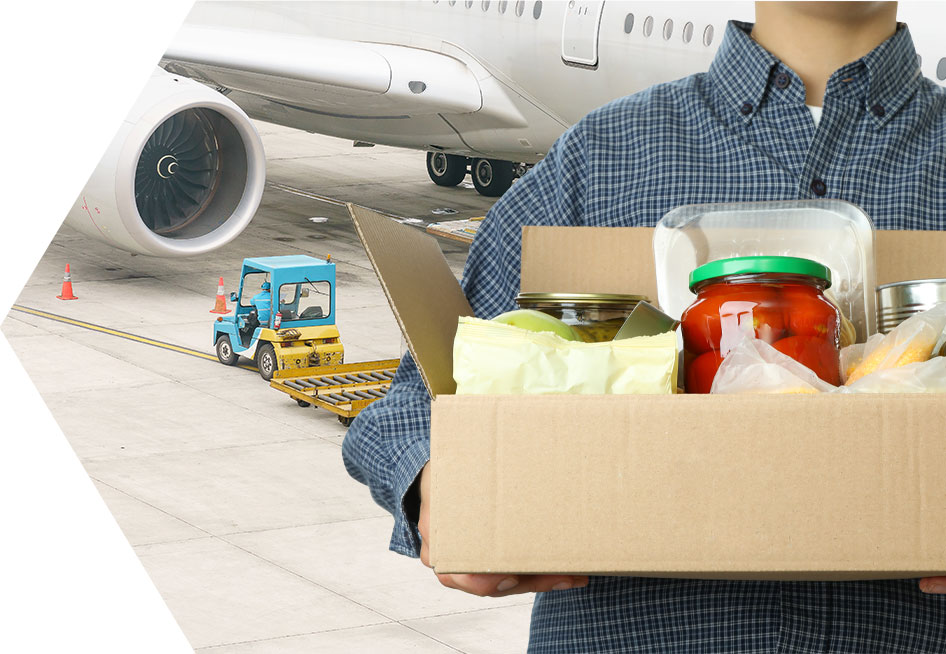Shipping perishable goods presents unique challenges that demand precision, efficiency, and expertise. As global trade continues to expand, the need for reliable logistics solutions to transport fresh produce, dairy, meat, and other time-sensitive products has never been more crucial. From maintaining optimal temperatures through advanced cold chain logistics to navigating complex customs regulations, understanding the best practices in perishable freight forwarding is essential for ensuring product freshness and quality upon arrival. In this article, we will explore the key strategies, technologies, and regulations involved in perishable shipping, equipping you with the knowledge needed to make informed decisions and maximize the success of your international logistics operations.
Related Article : Shipping From China To Kenya

Types of Perishable Goods Commonly Shipped
In the realm of international logistics, particularly when dealing with perishable goods, it is crucial to understand the various categories of products that fall under this classification. Perishable goods are items that have a limited shelf life and can spoil, rot, or decay quickly. Here are some common types of perishable goods that are frequently shipped from China to Kenya:
| Type of Perishable Goods | Description |
|---|---|
| Fresh Fruits and Vegetables | Items such as bananas, apples, and leafy greens that require specific temperature and humidity conditions to maintain freshness. |
| Dairy Products | Products like milk, cheese, and yogurt that must be kept refrigerated to prevent spoilage. |
| Meat and Seafood | These items, including chicken, beef, fish, and shellfish, are highly sensitive to temperature changes and require careful handling. |
| Pharmaceuticals | Certain medications and vaccines that need strict temperature control to maintain their efficacy. |
| Flowers and Plants | These items are often shipped for commercial purposes and require specific conditions to stay fresh during transit. |
Understanding the types of perishable goods that are commonly shipped helps logistics providers like Dantful International Logistics implement effective strategies for preservation and ensure that products reach their destination in optimal condition.
Challenges in Perishable Freight Forwarding
Shipping perishable goods presents unique challenges that require careful planning and execution. Here are some of the most common obstacles faced in perishable freight forwarding:
Temperature Control
Maintaining the right temperature is crucial for the integrity of perishable goods. Variations can lead to spoilage or decay, resulting in significant financial losses. Effective shipping solutions often involve the use of refrigerated containers, also known as reefer containers, that can maintain specific temperatures throughout the journey. This aspect of logistics is particularly vital when shipping ocean freight over long distances.
Time Sensitivity
Perishable goods are inherently time-sensitive, requiring swift transport from the point of origin to the destination. Delays in shipping can drastically affect the quality of the products. Logistics providers must meticulously plan routes, modes of transport, and schedules to minimize transit times. Dantful International Logistics specializes in ensuring timely delivery through strategic planning and real-time monitoring of shipments.
Customs Clearance for Perishable Goods
Navigating customs regulations can pose a significant challenge for shipping perishable items. Each country, including Kenya, has specific rules regarding the importation of food and other perishable goods. Ensuring compliance with these regulations is essential to avoid delays or fines. This often requires the knowledge of local customs laws and may involve additional documentation related to health and safety standards.
Packaging and Handling Requirements
Proper packaging is crucial for perishable goods to safeguard them against physical damage, contamination, and environmental factors. Many perishable items require specialized packaging that maintains temperature and humidity. Additionally, handling practices must be stringent to prevent any mishaps during loading, unloading, and transportation. Using trained personnel for these operations can significantly reduce the risks associated with shipping perishable goods.
By addressing these challenges, logistics providers can ensure that perishable goods are shipped efficiently and arrive at their destination in excellent condition, safeguarding the interests of importers and consumers alike.
Key Services Offered by Perishable Freight Forwarders
When shipping perishable goods, it’s essential to partner with a reliable freight forwarder that offers specialized services designed to meet the unique needs of these products. Here are the key services typically provided by perishable freight forwarders:
Cold Chain Logistics
Cold chain logistics is a vital component of shipping perishable goods. This service encompasses the entire process of maintaining the required temperature during storage and transportation, ensuring that products remain in ideal conditions from the point of origin to the destination. By employing refrigerated vehicles and storage facilities, cold chain logistics minimizes spoilage and maintains product quality throughout the journey.
Real-time Temperature Monitoring
The ability to monitor temperatures in real-time is essential for ensuring that perishable goods remain within safe temperature ranges. Advanced technology, such as IoT sensors, allows freight forwarders to track the conditions of shipments in real-time. This service provides peace of mind to importers, as they can receive alerts if temperature fluctuations occur, enabling quick corrective actions to protect their goods.
Expedited Customs Clearance
Customs clearance can be a significant hurdle in shipping perishable goods. Perishable freight forwarders often offer expedited customs clearance services to navigate the complexities of importing food and other sensitive items. This service includes preparing the necessary documentation, understanding local regulations, and ensuring compliance with health and safety standards, all aimed at reducing delays at customs.
Specialized Packaging Solutions
Proper packaging is crucial for the safe transport of perishable goods. Freight forwarders provide specialized packaging solutions tailored to the specific needs of different products. This may include insulated packaging, moisture-proof materials, or temperature-controlled containers that not only protect the goods from environmental factors but also ensure they arrive at their destination in optimal condition.
Selecting a Reliable Perishable Freight Forwarder
Choosing the right freight forwarder for perishable goods is essential for successful shipping. Here are some critical factors and questions to consider when selecting a reliable partner:
Factors to Consider
- Experience: Look for a forwarder with extensive experience in handling perishable goods and a strong track record.
- Network: A robust network of partners, including cold storage facilities and transportation providers, can enhance service quality and reliability.
- Technology: Assess the technology and systems in place for monitoring shipments and managing logistics.
Dantful’s Advantages in Perishable Freight Forwarding

Dantful International Logistics stands out as a premier choice for handling perishable freight due to its comprehensive suite of services tailored to meet the unique challenges associated with shipping perishable goods. Our expertise in cold chain logistics ensures that products are kept at optimal temperatures throughout the journey. We utilize state-of-the-art real-time temperature monitoring systems that provide our clients with peace of mind.
Additionally, Dantful offers expedited customs clearance, enabling swift passage through regulatory hurdles, thus minimizing potential delays. Our specialized packaging solutions are designed to protect the integrity of your goods during transit, ensuring they arrive in perfect condition. By choosing Dantful, clients benefit from our dedication to excellence in ocean freight and our commitment to customer satisfaction.
Dantful International Logistics Services:
- Dantful Ocean Freight Services
- Air Freight From China
- Amazon FBA Freight Forwarding
- WAREHOUSE Services
- One-Stop Customs Clearance Solution
- Cargo Insurance Services in China
- DDP Shipping Services By Dantful Logistics
- Out of Gauge Cargo Transportation Shipping Services
Choosing the Right Shipping Method
When it comes to shipping perishables, selecting the right method of transport can significantly impact the quality of the goods upon arrival. Here, we explore the two most common methods used: air freight and sea freight.
Air Freight vs. Sea Freight for Perishables
- Air Freight: This method is often preferred for highly perishable items that require swift transportation. Air freight reduces transit times significantly, often delivering goods within 24 to 48 hours, which is critical for maintaining freshness. However, it can be more expensive compared to sea freight.
- Sea Freight: While generally more cost-effective for bulk shipments, sea freight can be slower, with transit times ranging from several days to weeks. For less time-sensitive products, sea freight can be a viable option, especially when utilizing refrigerated containers to maintain appropriate temperatures.
Pros and Cons of Each Method
| Shipping Method | Pros | Cons |
|---|---|---|
| Air Freight | – Fast transit times – Ideal for highly perishable goods – Reduced spoilage risk | – Higher costs – Limited cargo capacity – Potential for delays due to weather or logistics |
| Sea Freight | – Cost-effective for large volumes – Suitable for goods that are less time-sensitive – More cargo capacity | – Longer transit times – Greater risk of temperature fluctuations during transit – Requires careful planning for customs clearance |
Choosing the right shipping method depends on various factors, including the type of perishable goods, budget constraints, and urgency. Evaluating these aspects in conjunction with the capabilities of your freight forwarder will help ensure a successful shipping experience.
READ MORE:
- Shipping From China To Algeria
- Shipping From China To Angola
- Shipping From China To Morocco
- Shipping From China To Nigeria
- Shipping From China To Kenya
- Shipping From China To Tanzania
- Shipping From China To South Africa
Documentation and Regulations

Shipping perishable goods requires strict adherence to various documentation and regulatory standards to ensure compliance and successful delivery. Understanding the necessary permits and regulations is crucial for both exporters in China and importers in countries like Kenya. Below, we explore the key aspects of documentation and regulations when shipping perishables.
Required Permits and Certificates
Before shipping perishable goods, exporters must obtain several permits and certificates to comply with international shipping laws and regulations. Commonly required documents include:
- Phytosanitary Certificate: This document certifies that plant products comply with the importing country’s health regulations. It is essential for fresh fruits, vegetables, and other plant-based products.
- Health Certificate: For animal products, such as meat and dairy, a health certificate is necessary to demonstrate that the goods are safe for consumption and free from diseases.
- Import Permit: Many countries require import permits for specific perishables, which regulate and monitor the type and quantity of goods entering the market.
Understanding and preparing these necessary documents can facilitate smoother customs clearance and ensure that the goods reach their destination without unnecessary delays.
Compliance with Kenyan Import Regulations for Perishables
Kenya has specific import regulations to protect public health and the environment. Importers must familiarize themselves with these regulations to avoid penalties or shipment rejections. Key compliance requirements include:
- Inspection Requirements: Perishable goods are subject to inspection upon arrival. Importers need to ensure that the products meet Kenyan health and safety standards.
- Certification by the Kenya Bureau of Standards (KEBS): Products must be certified to ensure they meet the quality standards set by KEBS, which governs food safety and consumer protection.
- Adherence to the Food Safety and Quality Regulations: These regulations stipulate guidelines for safe handling, storage, and transportation of food products, which is particularly crucial for perishables.
Importers must stay updated on the latest regulations and work closely with their freight forwarders to ensure compliance and smooth customs processing.
Chinese Export Regulations for Food Products
In addition to understanding the import regulations in the destination country, exporters must also comply with Chinese export regulations concerning food products. Key aspects include:
- Quality Control Standards: Exporters must adhere to China’s National Food Safety Standards (NFSS), ensuring that all food products meet safety and quality requirements before being shipped.
- Documentation Requirements: Exporters must provide necessary documentation, such as export licenses, phytosanitary certificates, and health certificates, to facilitate customs clearance in importing countries.
- Traceability Requirements: Chinese regulations mandate that food products be traceable from farm to table, ensuring accountability and safety throughout the supply chain.
By ensuring compliance with these regulations, exporters can mitigate risks associated with legal challenges, penalties, and shipment rejections.
Best Practices for Perishable Shipping
Shipping perishable goods necessitates meticulous planning and execution to ensure quality and freshness upon arrival. Implementing best practices in perishable shipping can significantly mitigate risks associated with spoilage and enhance customer satisfaction. Here are some essential practices to consider:
Pre-Cooling Procedures
Pre-cooling is a critical step in preparing perishable goods for shipment. This process involves cooling the products to their optimal temperatures before they are loaded for transport. Key aspects include:
- Temperature Management: Ensure that items such as fruits, vegetables, and meats are cooled to the specified temperatures based on their unique requirements. This helps slow down decay and maintain freshness during transit.
- Timing: Pre-cooling should occur as soon as products are harvested or produced to prevent temperature fluctuations that could compromise quality.
- Equipment: Utilize appropriate pre-cooling equipment, such as blast chillers or refrigerated storage units, to effectively lower temperatures.
Proper Packaging Techniques
Packaging plays a vital role in protecting perishable goods throughout the shipping process. Implementing proper packaging techniques can help maintain product integrity and minimize spoilage. Consider the following best practices:
- Use Insulated Containers: Choose insulated packaging materials that provide thermal protection against temperature variations.
- Moisture Control: Incorporate moisture-absorbing materials within the packaging to prevent condensation, which can lead to spoilage.
- Ventilation: Ensure that packaged items have adequate ventilation to allow for air circulation, reducing the risk of mold and spoilage.
Minimizing Transit Time
Reducing transit time is crucial when shipping perishable goods. Longer transit times increase the risk of spoilage, so consider the following strategies:
- Select the Appropriate Shipping Method: Use air freight for highly perishable items that require rapid transport, while ocean freight may be suitable for less time-sensitive goods.
- Optimize Routes: Work with your freight forwarder to determine the most efficient shipping routes, taking into account factors such as traffic, weather conditions, and any potential delays.
- Effective Scheduling: Plan shipments during times when transportation resources are most available to minimize delays and ensure timely delivery.
Contingency Planning
Despite meticulous preparation, unforeseen challenges can arise during the shipping process. Having a contingency plan in place is essential for addressing potential issues. Key components of effective contingency planning include:
- Risk Assessment: Identify potential risks, such as equipment failures, natural disasters, or regulatory changes, and develop strategies to mitigate these risks.
- Communication Protocols: Establish clear communication channels with all stakeholders, including suppliers, transportation providers, and customers, to ensure everyone is informed of any changes or issues.
- Backup Solutions: Have alternative transportation options and resources available to address unexpected disruptions, ensuring that products can be rerouted or rescheduled promptly.
FAQs
Q1: What are the most important factors to consider when shipping perishable goods?
A1: Key factors include temperature control, proper packaging, transit time, and compliance with regulations. Ensuring that these aspects are managed effectively will help maintain product quality during shipping.
Q2: How can I ensure my perishable products remain fresh during transit?
A2: Employ pre-cooling procedures, use insulated packaging, minimize transit time, and implement effective contingency planning. Investing in these practices will contribute significantly to preserving freshness.
Q3: What documentation is required for shipping perishable goods?
A3: Commonly required documentation includes health certificates, phytosanitary certificates, and import permits. Compliance with both the exporting and importing country’s regulations is essential.
Q4: What shipping method is best for perishable goods?
A4: Air freight is generally preferred for highly perishable items due to its speed, while sea freight may be more suitable for less time-sensitive products. The choice depends on the product’s specific needs and budget considerations.
Q5: How does technology improve perishable freight forwarding?
A5: Technologies such as IoT devices for temperature tracking, blockchain for supply chain transparency, and AI for route optimization enhance efficiency and ensure that perishable goods are shipped effectively and safely.

Young Chiu is a seasoned logistics expert with over 15 years of experience in international freight forwarding and supply chain management. As CEO of Dantful International Logistics, Young is dedicated to providing valuable insights and practical advice to businesses navigating the complexities of global shipping.
The other language versions of this article
- الدليل النهائي لوكلاء الشحن القابلة للتلف من الصين إلى كينيا
- De ultieme gids voor bederfelijke expediteurs van China naar Kenia
- Le guide ultime des transitaires de marchandises périssables de la Chine au Kenya
- Der ultimative Leitfaden für Spediteure verderblicher Güter von China nach Kenia
- La guida definitiva agli spedizionieri di merci deperibili dalla Cina al Kenya
- La guía definitiva para transitarios de productos perecederos desde China a Kenia
- O guia definitivo para despachantes de frete perecíveis da China ao Quênia
- Полное руководство по экспедиторам скоропортящихся грузов из Китая в Кению
- Çin’den Kenya’ya Bozulabilir Nakliye Nakliyecileri için Nihai Kılavuz




















 Afrikaans
Afrikaans Shqip
Shqip አማርኛ
አማርኛ العربية
العربية Հայերեն
Հայերեն Azərbaycan dili
Azərbaycan dili Euskara
Euskara Беларуская мова
Беларуская мова বাংলা
বাংলা Bosanski
Bosanski Български
Български Català
Català Cebuano
Cebuano Chichewa
Chichewa 简体中文
简体中文 繁體中文
繁體中文 Corsu
Corsu Hrvatski
Hrvatski Čeština
Čeština Dansk
Dansk Nederlands
Nederlands English
English Esperanto
Esperanto Eesti
Eesti Filipino
Filipino Suomi
Suomi Français
Français Galego
Galego ქართული
ქართული Deutsch
Deutsch Ελληνικά
Ελληνικά Kreyol ayisyen
Kreyol ayisyen Harshen Hausa
Harshen Hausa Ōlelo Hawaiʻi
Ōlelo Hawaiʻi עִבְרִית
עִבְרִית हिन्दी
हिन्दी Hmong
Hmong Magyar
Magyar Íslenska
Íslenska Igbo
Igbo Bahasa Indonesia
Bahasa Indonesia Gaeilge
Gaeilge Italiano
Italiano 日本語
日本語 Basa Jawa
Basa Jawa ಕನ್ನಡ
ಕನ್ನಡ Қазақ тілі
Қазақ тілі ភាសាខ្មែរ
ភាសាខ្មែរ 한국어
한국어 كوردی
كوردی Кыргызча
Кыргызча ພາສາລາວ
ພາສາລາວ Latin
Latin Latviešu valoda
Latviešu valoda Lietuvių kalba
Lietuvių kalba Lëtzebuergesch
Lëtzebuergesch Македонски јазик
Македонски јазик Malagasy
Malagasy Bahasa Melayu
Bahasa Melayu മലയാളം
മലയാളം Maltese
Maltese Te Reo Māori
Te Reo Māori मराठी
मराठी Монгол
Монгол ဗမာစာ
ဗမာစာ नेपाली
नेपाली Norsk bokmål
Norsk bokmål پښتو
پښتو فارسی
فارسی Polski
Polski Português
Português ਪੰਜਾਬੀ
ਪੰਜਾਬੀ Română
Română Русский
Русский Samoan
Samoan Gàidhlig
Gàidhlig Српски језик
Српски језик Sesotho
Sesotho Shona
Shona سنڌي
سنڌي සිංහල
සිංහල Slovenčina
Slovenčina Slovenščina
Slovenščina Afsoomaali
Afsoomaali Español
Español Basa Sunda
Basa Sunda Kiswahili
Kiswahili Svenska
Svenska Тоҷикӣ
Тоҷикӣ தமிழ்
தமிழ் తెలుగు
తెలుగు ไทย
ไทย Türkçe
Türkçe Українська
Українська اردو
اردو O‘zbekcha
O‘zbekcha Tiếng Việt
Tiếng Việt Cymraeg
Cymraeg יידיש
יידיש Yorùbá
Yorùbá Zulu
Zulu